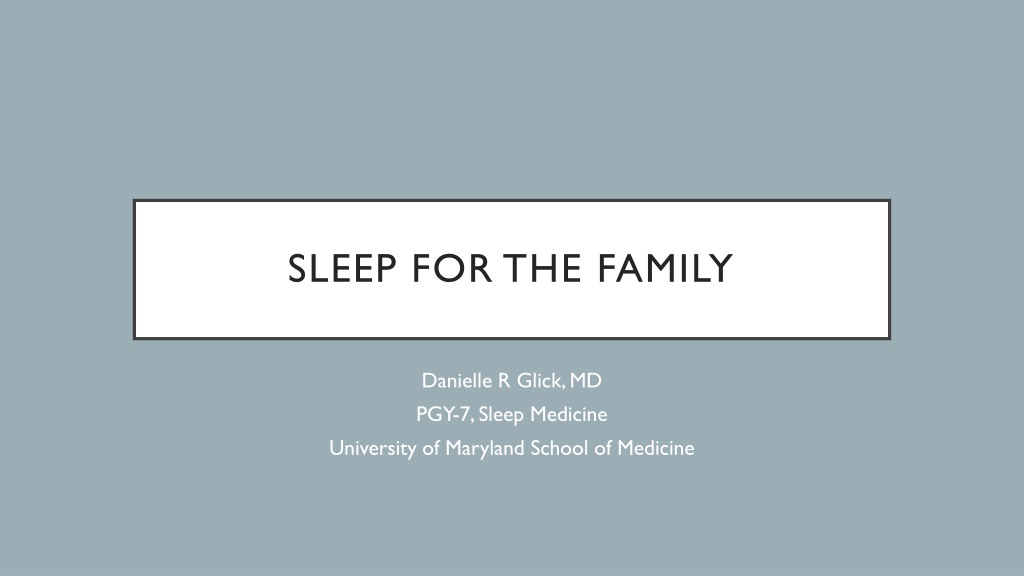
Family Sleep Habits and Needs for Healthy Living
Learn about the importance of good sleep habits for families, the impact of sleep on family dynamics, and recommended sleep durations for different age groups. Discover strategies to promote healthy sleep routines for both children and teenagers, contributing to overall family well-being.
Download Presentation

Please find below an Image/Link to download the presentation.
The content on the website is provided AS IS for your information and personal use only. It may not be sold, licensed, or shared on other websites without obtaining consent from the author. Download presentation by click this link. If you encounter any issues during the download, it is possible that the publisher has removed the file from their server.
E N D
Presentation Transcript
SLEEP FOR THE FAMILY Danielle R Glick, MD PGY-7, Sleep Medicine University of Maryland School of Medicine
LEARNING OBJECTIVES Describe the effects of sleep on the family as a unit Discuss sleep needs across ages Define healthy sleep habits for the family
GOOD SLEEP IS A FAMILY AFFAIR 50% of parents lose 30 minutes of sleep nightly Parental sleep quality suffers from poor sleep in children, resulting in increased: Daytime sleepiness Depression Parenting Stress Family stress can both: Be caused by poor sleep BBC Affect children s sleep National Sleep Foundation Meltzer and Montgomery-Downs. Pediatr Clin North Am. 2011.
HOW MUCH SLEEP DO WE ALL NEED? Age Recommended, h 14 17 12 15 11 14 10 13 9 11 8 10 7 9 7 9 7 8 May be appropriate, h 11-13 or 18-19 10-11 or 16-18 9-10 or 15-16 8-9 or 14 7-8 or 12 7 or 11 6 or 10-11 6 or 10 5-6 or 9 Not recommended, h < 11 or > 19 < 10 or > 18 < 9 or > 16 < 8 or >14 < 7 or > 12 < 7 or >11 < 6 or > 11 < 6 or > 10 < 5 or > 9 Newborns 0-3 months Infants 4-11 months Toddlers 1-2 years Preschoolers - 3-5 years School-aged 6-13 years Teenagers 14-17 years Young adults 18-25 years Adults 26-64 years Older adults 65+ years NATIONAL SLEEP FOUNDATION. SLEEP HEALTH, 2015;1:40-43.
SETTING A ROUTINE: YOUNG CHILDREN Regular sleep cycles develop by 6 months Quiet routine, consistent time Quiet, safe sleep environment Promote falling asleep in bed Avoid responding to crying or calling out Do not sleep or lay down with your child HEALTHYCHILDREN.ORG, AMERICAN ACADEMY OF PEDIATRICS 2007
SETTING A ROUTINE: SCHOOL-AGED AND TEENAGERS Routine remains key: Clean, neat sleeping area Quiet bedtime activities Decreasing parental involvement Maintain bed and rise times Electronics: Out of bedroom Minimize nighttime use Daytime routines matter too! SLEEP FOUNDATION
CONSISTENCY IMPROVES SLEEP FOR THE WHOLE FAMILY Consistent bed and rise times Bedtime routines: Relaxation techniques Stress journal Protect sleep time Remove screens Cool, dark, quiet bedroom environment Avoid heavy meals, alcohol, exercise before bed HEADSPACE
SLEEP SUPPORTS THE FAMILY Sleep begets sleep Poor sleep increases family stress and vice versa Routines at each age/stage creates lifelong healthy sleep Talk to your patients (and your family!) about their sleep If sleep disruption persists, consider Sleep Medicine Meltzer and Montgomery-Downs. Pediatr Clin North Am. 2011.
CME ACCREDITATION AND DESIGNATION This activity has been planned and implemented in accordance with the Essential Areas and policies of the Accreditation Council for Continuing Medical Education (ACCME) through the joint providership of MedChi, The Maryland State Medical Society and the Behavioral Health Administration of the Maryland Department of Health. MedChi is accredited by the ACCME to provide continuing medical education for physicians. CMEs will be available at no cost, as will Participant Certificates, which for other disciplines may qualify for CEUs or other continuing education credit, although these are not approved for CEUs by the Maryland Board of Social Work Examiners. Participants should check with their certifying organizations to see how these would apply. MedChi designates this webinar educational activity for a maximum of 1 AMA PRA Category 1 Credits should claim only the credit commensurate with the extent of their participation in the activity, as should other disciplines who claim credit for Participant Certificates. For CME/Participant Certificate questions please contact Sherrie Noonan at sherrie.noonan@maryland.gov. . Physicians Webinars jointly sponsored by the Behavioral Health Administration and MedChi
CME DISCLOSURES Presenters and Planners: Aliya Jones, MD and Steve Whitefield, MD have reported no relevant financial relationships to disclose. Emerson Wickwire, PhD, Danielle Glick, MD, and Howard Haft, MD have reported no relevant financial relationships to disclose. MedChi CME Reviewers: The reviewers from the MedChi Committee On Scientific Activities (COSA) for this activity have reported no relevant financial relationships to disclose. Webinars jointly sponsored by the Behavioral Health Administration and MedChi
RESOURCES www.healthychildren.org www.sleepfoundation.org https://bha.health.maryland.gov/Pages/bha-covid-19.aspx
